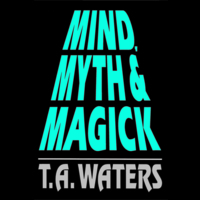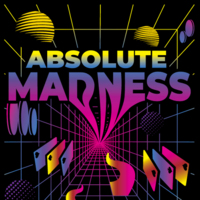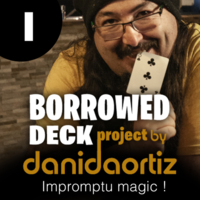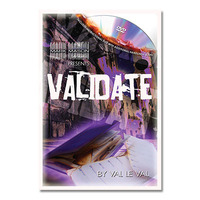RANDOM - Thoughts on Stacked Deck Magic from a Common Magician by Carl Irwin (Instant Download)
Stacked deck magic for the way you think.
| Price: | $10.00 |
RANDOM is an ebook about accessible approaches to stacked deck magic. In some situations, a stack that has cyclical properties will be sufficient. In other cases, the cards will need to be memorized for position. And still other cases may require elements of both types of stacks. The goal of this writing is to help beginners, hobbyists, amateurs, and even seasoned professionals to examine the topic of stacked decks and intimate memorization with fresh eyes, and more importantly with one’s OWN eyes. RANDOM pursues a natural thought process, allowing the acts of memorization and recall to be born out of one's thinking rather than forced into it!
This affordable eBook includes:
- Over a dozen accessible presentations
- 3 unique stack systems that can be learned quickly and recalled confidently during performance by even the most casual hobbyist.
- An examination of simple calculation methods and handling with tetridistic stacks.
- A suite of accessible and deceptive false shuffles that can be done with confidence.
- Several bonus presentations and methods unrelated to stacked deck magic.
- A bonus video aid with nearly 1 and a half hours of instruction on the stacks taught in the ebook.
This ebook can be read by any ebook reader with text-to-speech capability.
"RANDOM" is a tool kit for any performer looking to learn and employ stacked deck magic quickly, securely and confidently.
ASK HERE
Featured Magic Tricks
4 star 0%
3 star 0%
2 star 0%
1 star 0%

 Pick one Stack, eliminate the others
Report this review
Pick one Stack, eliminate the others
Report this review
Random is a pseudo-memorized deck masterclass. What I mean by pseudo memorized is that the stacks offered allow you to do memorized deck work, without the work of Mnemonica. Something unique about these stacks, especially the tetradistic one, is that going from card to number, number to card, and card to next card or previous card are all simple. With the easy stack systems I am aware of, like Joyal, Bart Harding, and Stebbins, either knowing the next card easily, or knowing the card’s position easily, are sacrificed.
“It is because of my irregularity in performing that I have investigated these solutions to the question of prepared deck magic. Without the regular attention that is required to maintain mental skill sets, I needed a system that was more intuitive and reliant on self-evident observations. This book contains the best answers to that problem that I have found to date. I also don’t want to be overly modest. I absolutely affirm that the approaches discussed here are adequate for professional work.”
Mr. Irwin encourages readers to find approaches that suit their natural thinking. His stacks all use memory techniques that don’t require learning a “system”. That’s good in my eyes.
After the stacks are explained, you are given tools to handle your deck. Ways of making calculation easier with manipulation, ways of adding optional gimmicks, and devious methods of false shuffling.
There is an updated streamlined version of Carl’s effect, Going Home, where a named card is found to be the only one in the position of new deck order. There is no manipulation of the deck after the card is named. This trick is not for me, but if you like the effect, you will like this method.
Commonicosis is a variant of Mnemonicosis, that gives the same basic effect as Mnemonicosis, but without any real jazzing, or fast calculations. Here’s what happens:
- The spectator names any card
- The spectator cuts the deck
- A small number of cards is dealt(The amount of cards is justified)
- They find their card.
- This can be repeated
Many magicians love the Mnemonicosis effect. But do they love it because it is a strong effect, or because performing it makes them feel like a ninja? Even though Carl's approach to memorized deck work eschews any notion of "Jazzing", I found that it is easier to do it with his tetradistic common stack, then with any other stack.
Selected Card Divination:The main method is standard, however, the handling and presentational ideas here are very valuable. This stack effect is the most well known, but often, magicians will not give it the respect it deserves.
4 of a Kind Production: Okay, let’s face it, a production of a named four of a kind with a random looking stack was never gonna be that simple. You are offered the choice between a difficult sleight or a DIY gimmick. While there is nothing that revolutionary about the handling offered, I am glad it is included for the less cyclical stacks, as I would not have figured that out.
Gambling Demo:I love this idea. It is easy. It works with almost any stack. You can make the spectator the star.
ACAAN: This method of ACAAN is designed to work with the stacks in the book. However, the method is totally useable with any memorized stack, without modification. It is easy to do. However, the lesson here is not just about the trick, but the theory behind it. Carl explains why we should NOT aim to satisfy conditions to make tricks more impossible. (And his alternative is not some mumbo jumbo, like getting the spectator in the mood to suspend critical thinking capabilities)
The rest of the tricks are simple plots with freely named cards, but each one gives a completely different feel to the card at number plot.
Instruction:
The ebook is long and detailed. There is a companion video that is over an hour long, however, there were still some gaps where I thought the teaching could have been better (and that I still hope is added). There is one trick that requires an equivoque of a couple items. It would have been one page maximum to include the equivoque lines for the people who don’t know them, or maybe are not skilled in equivoque. So I don’t know why he has not included these. And yes, I know he has talked about equivoque about length on his YouTube channel.
I also would like to see some demo videos of working out some of the stack “calculations” in real time (they are easy once you get it), I think that would make the learning process more streamlined. Also, I think not having a section about converting position number to card is an oversight. It’s not difficult to figure out, but still in my opinion something that should be at least mentioned. It is a bit harder than finding the position from the card. But we’re talking like a difference between 2nd grade math and 4th grade math.

 Intelligent Stacked Deck Exploration
Report this review
Intelligent Stacked Deck Exploration
Report this review
While the title is vague the primary purpose of this book is to teach an accessible way to build and use a full deck stack, relying on Carl's common stack. This is not a way to expand your usage of Mnemonica, Aronson or any of the others. It does require a decision to use the Common Stack and there is some work involved in learning and applying it.
I’m a big fan of his trick "Going Home". As far as I know, the plot is original with him. There’s a download on Penguin, but I would certainly suggest that the information in this download is all you need and it may even be an advancement on the earlier work. This is where the best part of the book lies – his work on the Tetridistic stack. One stack is very simple and may well be all anyone ever needs. The other stack builds on this with throw offs designed to make the order less noticeable.
There’s information on card indexing and false shuffles. Nothing groundbreaking, but useful.
Is the book perfect? Nope! It’s a first edition of a self-published book and suffers from lack of editing. Carl is a little prone to run on sentences, but not bad. Descriptions are good, but could use a little cleanup in places to improve clarity.
The biggest flaws are the file is not searchable, although that can be fixed with freely available tools (which makes me wonder why it wasn’t done) and the Table of Contents isn’t linked, which is frustrating. Maybe there’s a reason for these omissions.
Anyway, I’m going with Five Stars. While I’m not one of the, “if I only get one trick out of a book, I’m happy” crowd, there’s A LOT of quality material here for a few bucks. I do fear his chosen moniker of The Common Magician tends to trivialize his work, which is a shame.

Act Builder beta


















































